FRIEDA (1947)
A young woman from Nazi Germany struggles to be accepted in an English town.
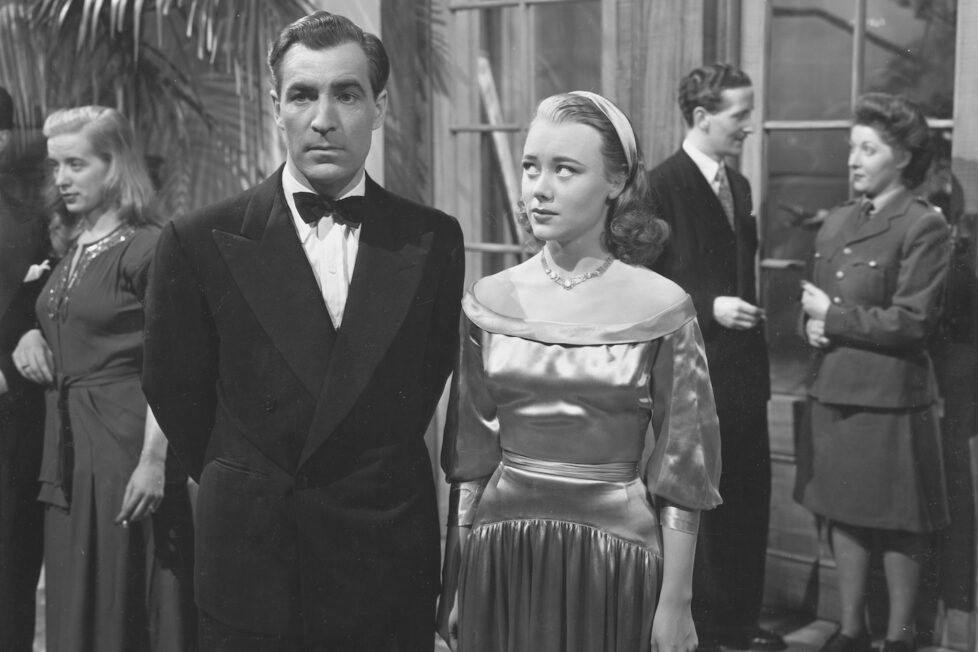
A young woman from Nazi Germany struggles to be accepted in an English town.


Though not as well-known today as movies like Victim (1961) or The Smallest Show on Earth (1957), Frieda may count as one of Basil Dearden’s best—not only made with the consummate excellence typical of Ealing Studios’ heyday under Michael Balcon, but gaining an exceptionally sharp edge through its treatment of a then raw subject: the post-war relationship between Britons and Germans (and by extension, their countries).
Released only two years after World War II had ended, it spoke to fears, assumptions, prejudices and, of course, experiences that for many of its audience were still very much current, and in that it gains a sense of urgency and genuine dilemma that later treatments of the same issue (2019’s The Aftermath, for example) necessarily lack.
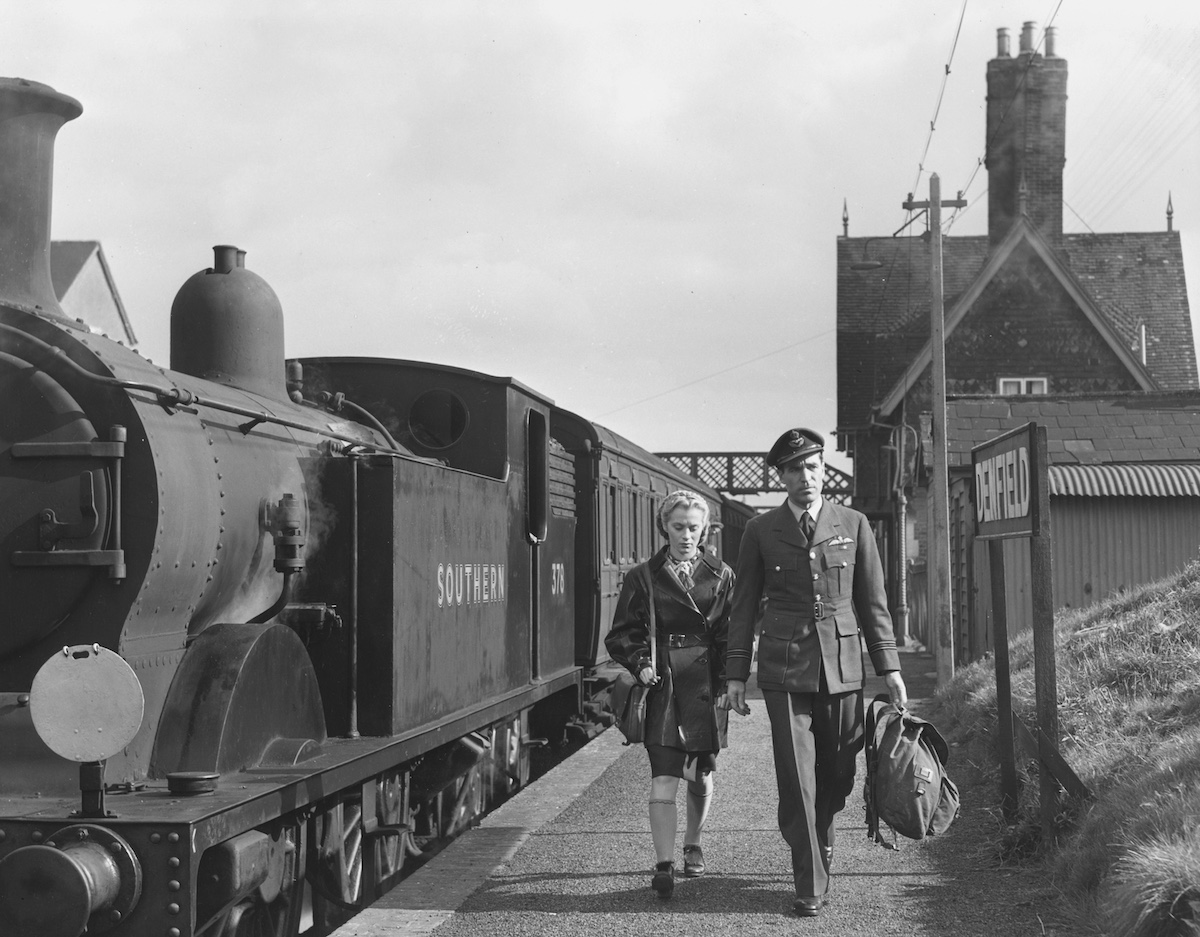
Studio Canal’s Blu-ray reissue warns, indeed, about “historical attitudes” that may be “outdated or offensive”. But they’re the entire point of Frieda, based on a Ronald Millar play (which has a different and more pessimistic ending), which was promoted as a daring “social problem” movie.
The problem here is, in essence, the debate over the existence of “the good German”: whether individual Germans always bear (in 1947) some guilt for the Third Reich, and if so how far that excludes them from normal society. It had already been addressed in cinema, of course, for example by Michael Powell and Emeric Pressburger as early as 49th Parallel (1941), but rarely as intensely as in Frieda.
Of course, the question Frieda asked its audiences wasn’t just about Germans; it was about Britons too. So it is, perhaps, not too much of a surprise that the titular Frieda (played by the Swedish Mai Zetterling in the 1947 absence of well-known German actresses) is a rather enigmatic character, almost bland despite her moments of high emotion, and one about whom we ultimately learn little. The real drama is played out by the English amongst whom she must live when she flees Poland toward the end of the war with her husband to settle in his family’s small town in Oxfordshire.
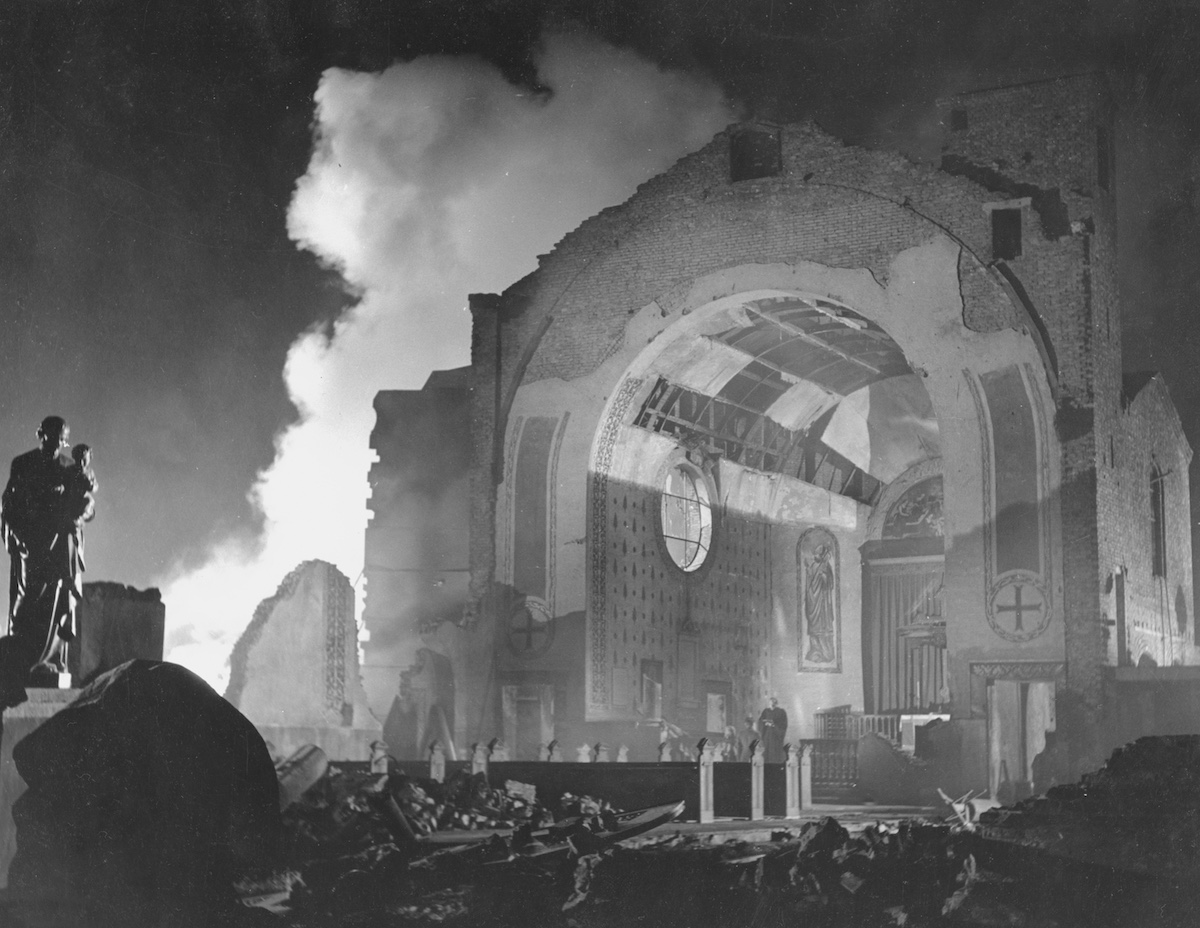
“Can they like me?” she wonders. Yes, he assures her as they make their way from ruined Krakow (vividly depicted) back to safety; there is “nothing to be frightened of in England… certainly not in Denfield.”
He is Robert (David Farrar), a downed RAF airman, she’s a nurse who’s helped him; and he marries her, in a bombed-out Polish church, so she can escape from the wreckage of the Reich, rather than for love. But back in Denfield, of course, few share his sense of obligation toward her and some are outright hostile. “She has nice quiet ways,” one resident suggests. “So does a mine till it explodes” retorts another. Gossip and stares are only the beginning. A builder refuses to do repairs on the home of Robert’s family; boys are withdrawn from the school where he has regained his old job as a master.
Emotions are further heightened by the revelation that Frieda’s German parents were killed in an air raid on Cologne, the same city where Robert’s brother was shot down and presumably died—the film here raising, without excessive comment, the point that German civilians suffered at Allied hands too—and then by the unexpected arrival of a figure from Frieda’s past.
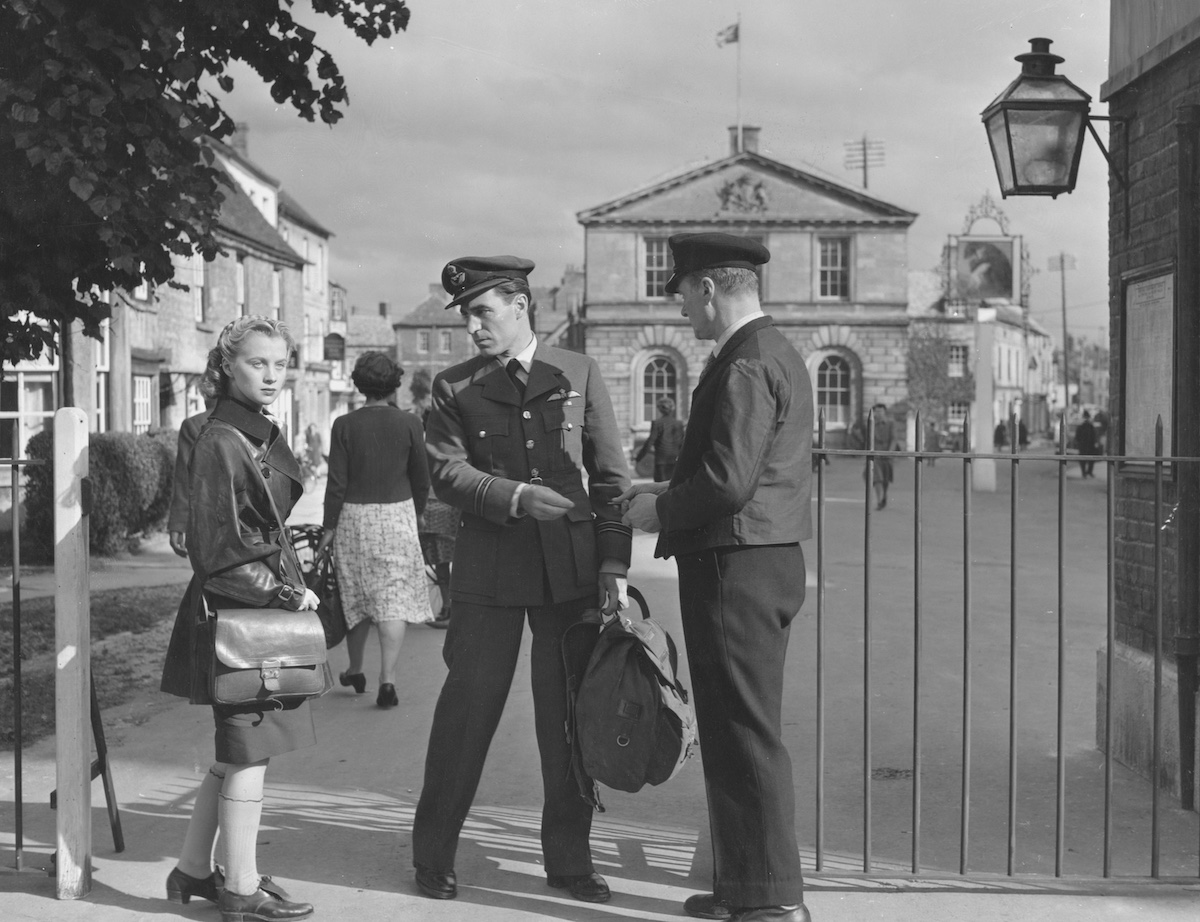
This individual (Albert Lieven, slightly too mad-eyed and fanatical) is crucial to the mechanics of the plot but also takes Frieda too close to melodrama. More genuinely interesting and the real focus of the film more than Frieda herself is the German woman’s treatment by Robert’s aunt Nell (Flora Robson).
Nell, who—remarkably for the time—-is running for Parliament in the General Election of 1945, believes all Germans are guilty of the “monstrous crime” of war. There are faint, momentary hints that she might have doubts about this and, of course, the question of whether she will overcome her theoretical objection to Germans once she gets to know a real-life German in the flesh is a key one in Frieda. But for most of it, at least, she’s adamant, at one point even insisting to another family member—Judy (Glynis Johns)—that she’s actively trying not to feel.
Frieda is positively bulging with dramatic potential, then, and Dearden makes the most of it magnificently. In a film that ties together several storylines (Robert and Frieda; Judy and Frieda; Nell’s election campaign) much of the mood, from exuberance to devastation, is created by direction and Dearden gets every scene tonally spot-on, as well as skilfully linking from each episode or dialogue passage into the next.
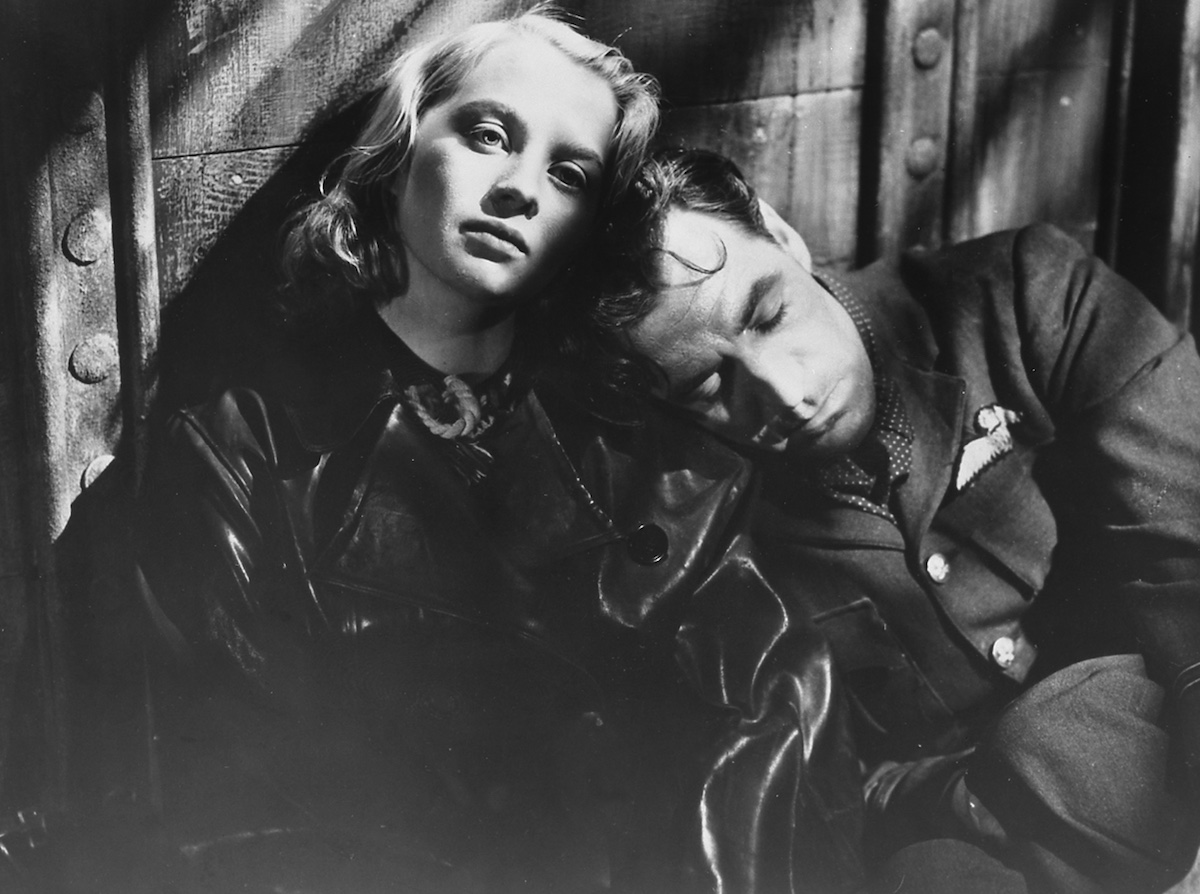
Much of the movie is filmed in a style that we often associate with horror— looming furniture, pronounced shadows, and half-lit faces—but which is also characteristic of the psychological thrillers coming to prominence in the 1940s. At other times it rushes ahead with great energy (though there’s plenty of talk, Frieda never feels remotely static, and even a train seems fast!); particularly impressive here is a montage of election speeches and voter canvassing, as well as an early sequence featuring a seamless stream of locations and introducing many of the main characters (Poland, then a street in Denfield, then the family house, the church, a wedding inside it, and finally the wedding reception).
Humour is not entirely absent either despite Frieda’s grave subject matter— at the Denfield ration office, a young civil servant has diligently prepared a speech in German, unaware that the town’s new resident speaks English. But inevitably it’s the darker moments that have the most impact, particularly Robert and Frieda’s slow, silent departure from a cinema where they have watched newsreel footage of Bergen-Belsen, and an extraordinary, almost surreal drowning scene toward the end, somewhat reminiscent of the nightmare conclusion (also directed by Dearden) to 1945’s multi-director Dead of Night.
Dearden’s masterful control of Frieda is supported by several fine performances, notably from the women: particularly Robson as Aunt Nell, a fascinatingly un-feminine lady (for the period) with all the assertiveness you would expect from an ambitious woman in a man’s world. But Robson is careful not to stereotype her, or to make her rigidity of attitude toward Frieda seem unreasonable (“war’s not a football match” where you shake hands and revert to amiability afterwards, she argues); indeed, it’s a strength of the film that everyone’s viewpoint is at least understandable.

Gladys Henson has a good character role as the family housekeeper, while Barbara Everest as Robert’s mother (the only member of the cast to move to the film from the stage production) and Johns as Judy, the widow of Robert’s brother, add further perspectives on the German woman in these British women’s midst. Ray Jackson is also effective as Robert’s young nephew, though Farrar himself is a little stolid in the male lead.
Many Ealing movies of the war years and those immediately after provided drama built on a solid factual basis (in contrast to the often fanciful comedies with which the studio would become associated slightly later). Few, however, tackle quite such a difficult topic as Frieda—a question which really did lack easy answers that would be acceptable to everyone. The film ultimately makes no secret about its own views on the matter, but remains respectful of the alternative position and never becomes polemical.
To manage that is creditable; to manage that and also create a movie that remains consistently believable and gripping without sensationalising its subject matter is a sign that Frieda really ought to be ranked with Dearden’s more famed achievements. Perhaps this Studio Canal rerelease, with limited but useful extras, will help it on its way.
UK | 1947 | 98 MINUTES | 1.37:1 | BLACK & WHITE | ENGLISH


director: Basil Dearden.
writers: Ronald Millar & Angus Macphail (based on Millar’s stage play).
starring: David Farrar, Glynis Johns, Mai Zetterling & Flora Robson.
1 Comments
This site uses Akismet to reduce spam. Learn how your comment data is processed.

Thank you. A very perceptive review of Frieda. Just watched it for a second time. It’s one of Dearden’s best films. He is still an underrated director.